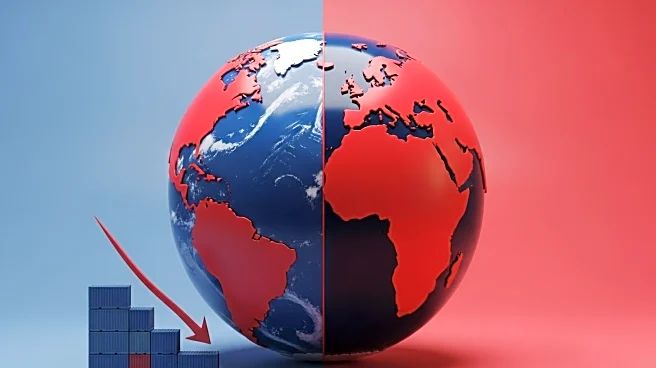What's Happening?
President Trump announced a significant increase in tariffs on Chinese imports, escalating trade tensions between the U.S. and China. The new tariff, set at 100 percent, will be effective from November 1, and is in response to China's proposed export controls on rare earth minerals. This announcement led to a sharp decline in U.S. equity markets, with the Dow Jones Industrial Average falling by 878.82 points and the S&P 500 dropping by 182.60 points. The footwear industry, heavily reliant on Chinese production, was notably affected, with major companies like Caleres Inc., Genesco Inc., and Steve Madden Inc. experiencing significant stock declines. The tariff increase comes amid ongoing bilateral trade talks, which had previously seen a temporary pause in tariff hikes.
Why It's Important?
The tariff increase poses a substantial threat to U.S. retailers and brands that depend on China for production, particularly in the footwear sector. The disruption could lead to increased costs and uncertainty for consumers, as companies may pass on the higher expenses. The footwear industry, despite efforts to diversify sourcing, remains heavily reliant on China's scale and efficiency. The tariff hike could also exacerbate inflationary pressures, reducing consumer options and potentially impacting holiday season sales. The broader economic implications include potential shifts in global trade dynamics and increased strain on U.S.-China relations.
What's Next?
The future of U.S.-China trade relations remains uncertain, with President Trump suggesting a possible cancellation of his meeting with China's President Xi Jinping. The footwear industry and other affected sectors may need to explore alternative sourcing strategies to mitigate the impact of tariffs. Additionally, ongoing trade negotiations between the U.S. and Vietnam could offer some relief, although details of any agreements are still being finalized. Stakeholders will be closely monitoring developments to adapt their business strategies accordingly.
Beyond the Headlines
The tariff increase highlights the complexities of global trade and the challenges of balancing economic interests with geopolitical considerations. It underscores the vulnerability of industries reliant on international supply chains and the potential for trade policies to influence market stability. The situation also raises ethical questions about the use of tariffs as a tool for political leverage and the broader impact on global economic cooperation.









